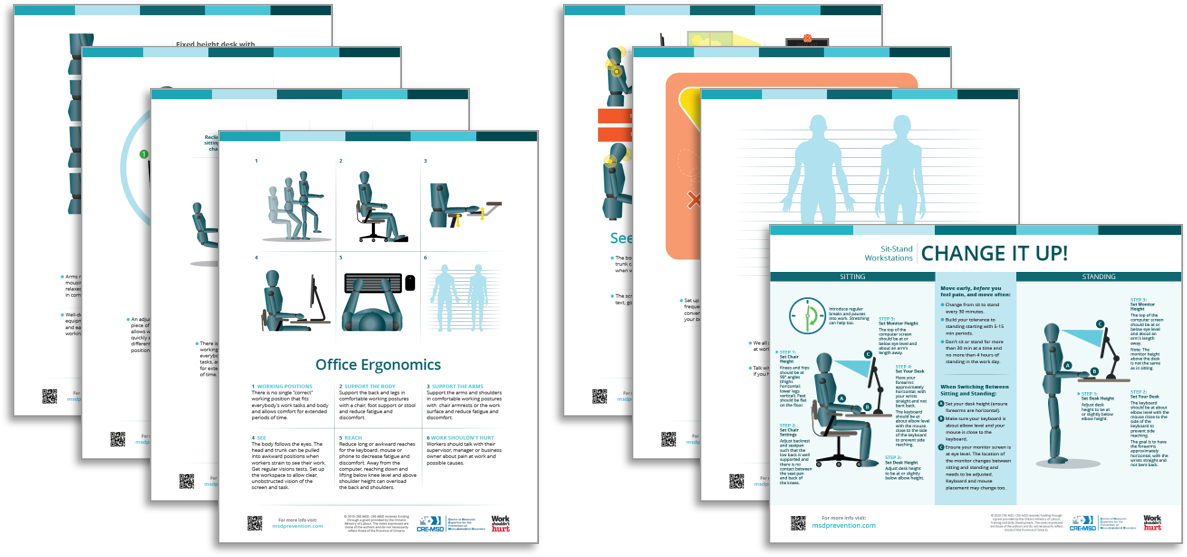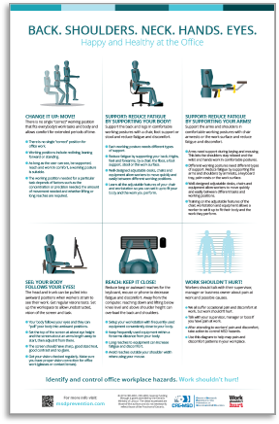Webinar series
The COVID-19 pandemic has forced a rapid change in the way we work and the need to support workers at the office and at home. Adjustments have been made including work hours, equipment, physical space layout and work format, be it virtual or masked in-person. The temporary remote work instituted in March of 2020 resulted in using makeshift workstations at kitchen counters, spare bedrooms, and living rooms, a situation that continues for many to persist over 1.5 years later.
Join CRE-MSD, IHSA, PSHSA, WSPS, and OHCOW during Global Ergonomics Month in October for this free webinar series featuring six international experts. The series will explore flexible/hybrid office environments and returning to on-site office workspaces, how these can be supported, the impact on health, moving beyond the constraints of individual productivity, and a look at what a true “virtual” workspace will look like in the future.
This five-part webinar series will examine research on how pivoting imposed by COVID-19 health hazards has impacted workers and challenged the health and safety support system’s ability to ensure ‘work shouldn’t hurt’. It will assist organizations to learn about and help prevent physical, cognitive and psychological challenges related to remote work practices implemented during COVID-19.
Other webinars in the series
Expanding the Bounds of Seated Virtual Workspaces
In this webinar
Many individuals shifted to a work-from-home situation in the Spring of 2020 and have remained there almost 18 months later. Further, many are expected to remain working at home into the near future, and potentially permanently. Several survey-based and observational studies have been conducted during the pandemic that may provide insights into the future of work-from-home.
Most individuals have been sent home with laptops without any other accessories such as external keyboards, monitors or a mouse. Findings show laptop use is very prevalent and prolonged, and that workers are commonly utilizing non-optional chairs. These behaviors have resulted in high levels of body discomfort (reports of moderate to severe pain by 49% of respondents for the neck and head, 45% for low back, and 62% for upper back and shoulders). If workers are going to continue to work-from-home, companies will need to accommodate them with more than a laptop, including other equipment such as an external keyboard, monitor, and mouse, along with both ergonomics education and a workstation evaluation.
For assistance, please contact Betina Butler at bbutler@uwaterloo.ca.
About the presenters

Dr. Kermit Davis is a Professor at the University of Cincinnati where he is the graduate program director of the Environmental and Occupational Hygiene and Occupational Safety and Ergonomics programs at the University of Cincinnati. Dr. Davis is a past-President of the Human Factors and Ergonomics Society (HFES) and a Fellow of HFES (2013) and American Industrial Hygiene Association (2019). His research has concentrated on reducing ergonomic stressors of healthcare workers and patients in healthcare settings (e.g., hospitals, long-term care facilities, and home healthcare). In the last year, his research has focused on virtual offices.

Dr. Susan Kotowski is an Associate Professor at the University of Cincinnati, College of Allied Health Sciences. She currently serves as the Secretary-Treasurer for the Human Factors and Ergonomics Society. She is also active in the American Industrial Hygiene Association and the Ergonomics Committee. In addition to teaching, Dr. Kotowski researches in the area of healthcare, particularly in relation to care provider, patient and product interactions and intervention effectiveness, but her varied interests also keep her tied to research in other areas such as office ergonomics and student learning. Dr. Kotowski is also a Certified Professional Ergonomist.
Other resources
We encourage you to take advantage of CRE-MSD resources such as the Office Quick Start Guideline, a collection of posters/infographics that provide basic information and quick workplace fixes for preventing MSD while performing office work. This free resource is part of the MSD Prevention Guideline for Ontario.



Disclaimer: CRE-MSD receives funding through a grant provided by the Ontario Ministry of Labour, Training and Skills Development (MLTSD). The views expressed are those of the presenters and do not necessarily reflect those of the Centre nor of the Province of Ontario.